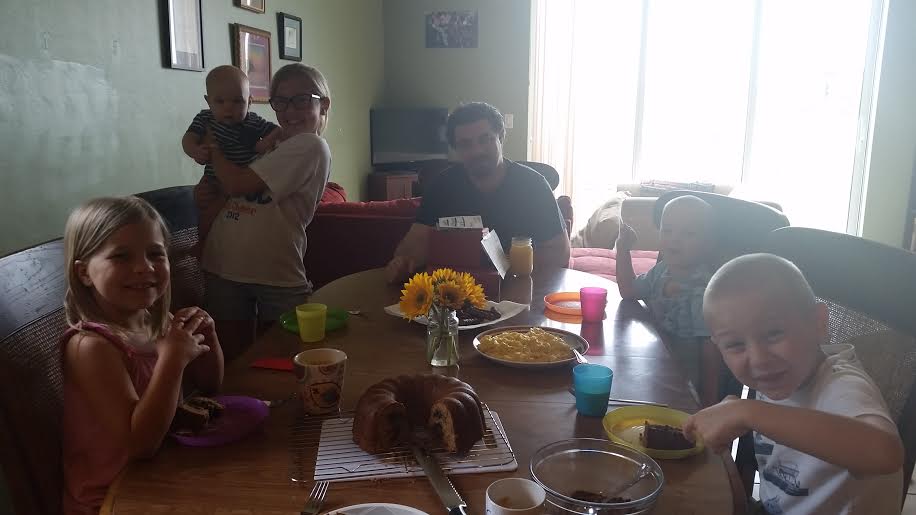I was going to write about the mantilla, and then I read Simcha’s post today at the Register and began crying into the oatmeal I was stirring.
The other night, the Ogre and I had one of those nasty fights which begin about something benign but then turn and start picking at the edges of the thing, that thing, that deep-down thing that’s been eating at you for weeks, for months, for years.
Name it, he said. Name it. What it it? And it’s not depression, so don’t try that one (he said as my lips began to form the word) I’ve seen you depressed. You’ve seen you depressed. You’re not depressed. What is this?
The same, the same, I said, nothing new, how it’s always been, not as bad now as the beginning, it’s better, getting better, every year getting better, I’m better now than I was before, in Vegas, in Dallas-
Name It! he broke in.
Anger. I said in a small voice. I’m angry.
No, he said, you’re not. I thought so too, for years, but that’s not it. You’re not angry. You’re not even unhappy. What is it?
I don’t know! I wailed. I wish I knew! I wish I could be like (insert perfect mothering model of the week here) always happy, always cheerful, sun-up to sun-down, happy to clean up after the kids and happy to sing them songs as she mops the floor and never stopping or snapping or weeping or wishing she could leave, could run, not forever, never forever but just for a day, an hour, a minute. Just one minute with no one asking or begging or clinging or spilling or screaming or fighting or smiling or laughing or hugging! Just one minute alone!
You resent us, he said.
And then there was silence, because I could not deny it.
And I hated myself for it. I hated myself that night as I had hated myself since the first time my daughter cried at 2 a.m. and I found myself wanting to jump out the window rather than pick her up again. As I had hated myself for the envy, the sickening, gut-wrenching envy I felt when my husband walked out the door in the morning and I had to face a desert of a day in which I had to fill the hours until he would return and instead of welcoming him and telling him how dreadfully I had missed him I was bitter and hateful and spiteful and cruel. And I hated myself for that, too.
I used to think I resented my family because I was forced into this life. Because I didn’t do things right. We didn’t date right, we didn’t get engaged right, we didn’t get married right and we certainly didn’t have our child at the right time. Basically we did everything backward. First the child, then the engagement, then the marriage, then years later, at long last, a semblance of dating came to us. A time when we learned to see each other anew, find things to feel tenderly about, and finally to love each other in a real way, the right way. I always thought that this resentment was my own particular evil to battle, my own punishment, to be carried out over the period of my life, to overshadow my family forever, the end result and final justice wrought upon me for the grievous offenses committed in my youth. No more than I deserved. No more than I had earned. To resent, always and forever, the ones I love the most. To always have that obstacle between my arms and theirs, to never be able to give them what I long to give them, only love, but instead to give them some poisonous mixture of love and resentment, so that when they go to bed they feel peace, secure in my love, but in the night their dreams brim with my resentment, bringing them back images of it during the day…in my anger, in my detachment, in my neglect, in my overscrupulosity. In the way I tie their hair so perfectly so that the world will see these children, well-clothed, and see their hair, well-kept, and think their mother must truly love them. In the way I smooth my husband’s tie or his hair or carefully pick out our clothes on the days we go and visit him on campus so that students and faculty will think, she’s a good wife. So that no one will ever guess at what lies buried in this house and in their eyes.
I used to think it was like a curse on our family, my resentment, something that would overshadow us forever so that everyone would think we were normal and fine and then when the children grew up and left people would come to the house and find the skeleton of resentment lying in an upstairs bed, and me lying next to it, never able to let it go. After I started blogging, I began to think that maybe it wasn’t just my curse, some peculiar punishment wrought for me alone, but maybe others struggled with it too.
I hinted at it in earlier posts and got responses from mothers saying they felt something similar. I found other mothers’ blogs that sometimes dealt with the same sort of feelings, but I don’t think I ever actually understood what it was I was even grappling with. I might have abstractly, but mostly I thought that I felt anger. I responded in anger. I lacked temperance, patience, charity and compassion. I was selfish, getting annoyed when the needs or desires of my family interfered with my own needs and desires. I was unwilling to die to self so that my family could live. And hashing it out in the confessional, or with the Ogre, with friends, with sisters-in-law, none of helped really, in the end. It’s true that things have improved over the early years of our marriage. I actually keep a clean enough house now, instead of putting off even the simple task of doing the laundry. And I don’t feel subjugated and enslaved when my husband asks me for something. I don’t insist that he do the dishes at night because I made dinner. I make the bed without wincing about the fact that making it means I can’t crawl back into it in the afternoon, and once I even vacuumed in pearls and high heels and didn’t want to find the highest tree in town to hang myself from. But it’s still there underneath, and I didn’t even realize what it really was until the Ogre told me.
So. I resent my family. I resent my family because their needs must come before mine. Not because they should, but because they must. The Ogre has a job to do and a family to support. He must sleep at night if he is to do that job well. He must have clean clothes if he is to look respectable, and he must have nutritious food, even if it means getting up half an hour earlier than I’d otherwise have to, if he is to think clearly in the classroom and in his writing. My children are children. They don’t know that half an hour won’t make much difference in the story they want me to read them. They don’t know that they won’t die of hunger if lunch isn’t served right now. They don’t understand that once I get the house fully unpacked we’ll have more free time to play outside. They only know that they want me to read them a story, that they’re hungry, and that the day is sunny and their friends are waiting. And ultimately, they’re right, because a half-hour will turn into an hour which will turn into two, and then I’ll have to make dinner and the story will be put off until tomorrow, and the next day, and the next.
But Simcha’s post this morning was like a wall smashing down, letting sunlight into the dark little cave I had made for us in my imagination.
To become a mother, I had to learn how to care about someone more than I did about myself, and that was terrible. But who I am now is something more terrible: the protector who can’t always protect; the one with arms that are designed to hold, always having to let go.
Dear mother of only one child, don’t blame yourself for thinking that your life is hard. You’re suffering now because you’re turning into a new woman, a woman who is never allowed to be alone. For what? Only so that you can become strong enough to be a woman who will be left.
I’m no longer a mother of only one child. And in the years that have passed since I was, I’ve changed. I’ve been worn in a little. I give of myself more, much more, for my husband and my children. And I have a very long way to go yet before I can be a woman strong enough to be left. Because how else could we send our children away, into the world, without our protection and love, unless we learn to love them more than we do ourselves? And not just a little bit more, but completely, utterly, wholly love them, so much so that when the house is empty and we have only ourselves to please again instead of being delighted with the silence and the peace at last we say, “Now, what shall I do? Now what do I live for?” And the days, then, will probably seem like deserts that we have to fill until they come back to visit us.
No, resentment is not something peculiar to me as a mother. It isn’t something that’s going to destroy our family from the inside out, as long as I keep it in the light, keep naming it, and keep chipping away at it with every “yes, now” instead of “no, later”. It seems that resentment is part of the universal experience of motherhood, just as it must be part of the universal experience of fatherhood, and consecration, and any vocation in which you are asked to learn to love something, every minute of every day, more than you love yourself. And it’s good that Simcha wrote about it. It’s good for other mothers to read about it, so they won’t smash their resentment down and stuff it away and let it fester until it becomes this monstrous thing in their minds. It’s a little bit like confession; you say it out loud, and it loses it’s power. It stops becoming a weight and shadow over your every step. It just becomes one more thing you have to work on, one more cross to carry, one more fire to burn in on your way to sanctification.











